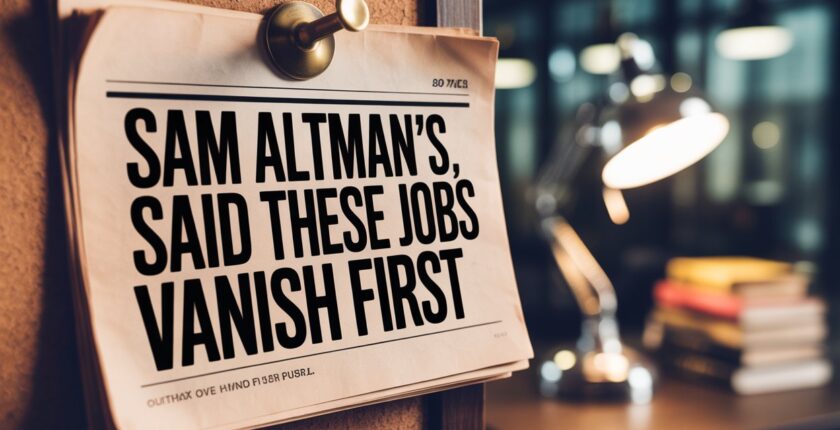Sam Altman’s Shocking AI Prediction: “These Jobs Won’t Exist Soon”
Introduction: A Wake-Up Call for Workers
Artificial Intelligence (AI) has already begun transforming our daily lives. From chatbots answering questions to AI tools writing code, the shift is undeniable. But in a recent interview on The Tucker Carlson Show, OpenAI CEO Sam Altman gave one of his most alarming warnings yet.
He said, with certainty, that some jobs will “surely not exist” in the near future. This prediction has left millions wondering: Which jobs are safe, which are doomed, and how fast will the change come?
In this article, we’ll break down what Altman said, which jobs are at risk, why this matters for the global economy, and what individuals can do to prepare.
What Exactly Did Sam Altman Say?
Sam Altman, the man behind ChatGPT and a leading voice in AI development, didn’t mince words during his talk with Carlson.
These Jobs are in trend
Here are the key takeaways:
- Service jobs are at highest risk: Customer support, tele-calling, and online service roles are among the first that AI will wipe out. Chatbots and AI voice assistants are already replacing human workers at record speed.
- Programmers may be next: While many think coding is future-proof, Altman suggested that AI is rapidly learning how to write, test, and debug software. This means junior developers and repetitive coding jobs are at risk.
- Jobs needing empathy will survive longer: Healthcare workers, caregivers, teachers, and roles that depend on human emotion and connection are less likely to vanish — at least for now.
- The pace is shocking: Unlike past revolutions (industrial, digital, internet) that took decades, AI disruption could wipe out entire industries in just a few years.
Why Altman’s Prediction Feels Different
This isn’t just another futurist warning. Altman is the CEO of the very company building the tools that could replace these jobs. His insights are based on what’s already happening inside AI labs.
Think about it:
- AI can now answer customer queries in seconds, in multiple languages, 24/7.
- AI coding assistants are helping companies build apps in days instead of months.
- AI image and video tools are replacing graphic designers, editors, and marketers for basic tasks.
If this is where AI stands in 2025, imagine where it will be by 2030.
Referral is the new way of Hiring
The First Jobs AI Will Replace
According to Altman and other experts, here’s the list of jobs that are most vulnerable:
- Customer Service Representatives
- Call centers and support desks are already testing AI-driven chatbots.
- Companies prefer AI because it never gets tired, doesn’t need a salary hike, and can handle thousands of customers simultaneously.
- Telemarketers & Sales Agents
- Cold calling can now be automated with realistic AI voices.
- Personalized AI scripts can sell products without a human in the loop.
- Data Entry Clerks
- Any job that requires repeating the same task — like filling forms, processing applications, or handling spreadsheets — is an easy target for automation.
- Basic Programming Roles
- AI systems like GitHub Copilot and ChatGPT are learning to generate entire websites and applications.
- Junior coding jobs may disappear, leaving only complex problem-solving roles for humans.
- Content Writers (Low-skill)
- Blogs, product descriptions, and news summaries are increasingly written by AI.
- Only high-level, creative, and strategic writing may survive.
Which Jobs Are Safer (For Now)?
Not every job is doomed. Altman himself highlighted that some roles are less vulnerable:
- Healthcare Professionals: Nurses, therapists, and doctors who provide human care and empathy.
- Educators & Mentors: Teachers who connect emotionally with students.
- Creative Visionaries: Artists, filmmakers, and innovators who push boundaries rather than just execute tasks.
- Leaders & Strategists: Decision-making roles that involve ethics, leadership, and human judgment.
The key difference? These jobs rely on empathy, creativity, and human trust — things AI hasn’t mastered.
The Economic Shockwave
If Altman’s prediction comes true, the economic consequences could be massive.
- Unemployment Crisis: Millions could lose jobs in customer support, IT, and service industries.
- Retraining Pressure: Workers will need to constantly upskill to stay relevant.
- Inequality Gap: Those with access to AI tools will thrive, while others may be left behind.
- Global Domino Effect: Developing countries that rely on outsourcing (like India and the Philippines) could be hit hardest.
Altman himself admitted that the speed of this disruption will be much faster than anything we’ve seen before.
Global Reaction: Hope or Fear?
Reactions to Altman’s comments are mixed.
- Optimists argue that AI will create new industries — just like the internet created jobs we couldn’t imagine in the 1990s (e.g., app developers, YouTubers, social media managers).
- Skeptics warn of a “job apocalypse” where only a small elite controls the wealth, while the rest struggle.
- Governments are now under pressure to consider solutions like Universal Basic Income (UBI) or rapid reskilling programs.
What Should You Do to Survive the AI Shift?
If you’re worried about your career, here are practical steps to future-proof yourself:
- Learn AI, Don’t Fight It
- Master AI tools in your industry. Become the person who knows how to use AI instead of being replaced by it.
- Focus on Human Skills
- Emotional intelligence, empathy, leadership, and creativity are much harder to automate.
- Keep Learning
- Take online courses in AI, data science, and future-focused skills.
- Stay updated on trends — jobs will change every few years.
- Diversify Income
- Don’t rely on just one job. Consider freelancing, side hustles, or entrepreneurship.
Conclusion: A Future That Can’t Be Ignored
Sam Altman’s warning is not science fiction. It’s a glimpse into a future that’s arriving faster than most people expect.
The question isn’t just “Will AI take my job?” but “How can I adapt before it does?”
The workers who embrace change, learn AI, and double down on human creativity will survive — and maybe even thrive. But for those who ignore it, the future could be exactly as Altman warned: a world where certain jobs simply no longer exist.


